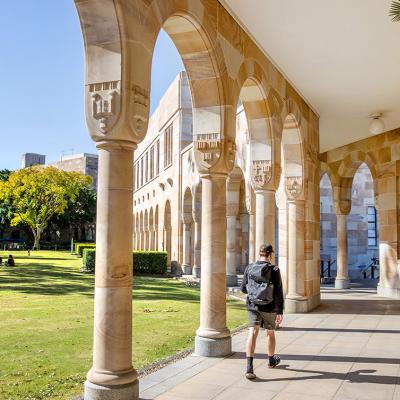If you’re in (or quickly moving towards) your final years of high school, you might be considering whether you want to go to university.
“Should I go to university?” can be a pretty loaded question. There’s a lot to think about, including your career goals, finances, family situation, and maybe even relocation. We’re here to help you break it all down – and bust a few myths along the way.
Do you have to go to university?
We’d love to see you strolling around the sandstone cloisters of UQ, soaking up some sunshine in the Great Court and hanging out at Pizza Caffe with your new study group. But we aren’t going to force you. University isn’t for everyone, and you shouldn’t feel pressured to attend just because it’s what all your mates are doing or what your teachers are telling you. Only you can decide whether or not you should go to uni.
Here are some questions you can ask yourself to help you reach a decision.
What careers are you interested in?
You might already know exactly what career you want. Or perhaps you've only just started thinking about your options. Either way, knowing what qualifications you'd need to get into your field of interest could help you decide whether uni is a good move. Let’s look at a few scenarios.

Chloe's favourite subject in high school is Psychology, and her dream is to be a psychologist. To become a registered clinical psychologist, Chloe needs university qualifications at both an undergraduate and postgraduate level. She needs to take an ATAR pathway through senior school and plan to study at university for around 6 years.
Do I need to go to university?
Like Chloe, you might find that you need a university degree to get into your dream career. You can use resources like My Future and Your Career to find out whether the careers you’re interested in pursuing require university-level qualifications.

Elliott isn’t quite sure what he wants to do as a career yet, but he enjoys English at school and spends a lot of spare time reading and writing. He has explored jobs in publishing and marketing when attending careers fairs. To learn more about these fields and gain qualifications in these areas, he can undertake a range of training from a certificate to a bachelor’s level. There’s also a wealth of short online courses available.
Elliott decides to look at the job market and see how competitive it is to break into these industries, so he has a better idea of the type of training that will help him build skills and become a strong job applicant. Because Elliott is still unsure what he wants to specialise in, he also searches for courses that will give him a taster of several areas of these industries before narrowing down to a specific role.
Does university help you get a job?
You might find yourself in Elliott’s situation, where you don’t technically need a university degree to get into your field of interest, but having one could make you a much more desirable candidate for a job. It’s also worth considering if the skills you’ll develop in a 3-year bachelor’s program, for example, will make you feel more prepared for your career than what you’ll learn in a short online course.

Dane wants to join the Australian Federal Police (AFP) and intends to start the application process after they turn 18 and complete Year 12. Dane is also interested in computers and thinks they might enjoy progressing their policing career into cyber crime in the future. For this reason, they decide to take an ATAR pathway through senior school to keep their options open. In case they aren’t successful in their application to join the AFP, they may be able to pursue university studies in cyber criminology instead. If they do get into the AFP, they can look at undertaking studies in this area to progress their career further down the line.
As you can see, some careers require a university degree, while for others, you may be able to undertake other training. Be sure to talk this through with your school’s career counsellor and do your own research to see what might be suitable for you. If you’re in Year 10, make sure you factor this research into your SET plan so you’re taking a pathway through senior school that supports your goals.
If you’re still exploring your career options, head over to our Career Pulse Hub to get inspired and match your interests with potentials careers.
Now we’ve covered the main way to answer the question “Should I go to university?”, let’s take a look at the other considerations that can help you reach a decision.
How can you pay for university?
Money is often a major consideration for high school students thinking about university. But it’s important to remember there are financial assistance programs and schemes out there to help you make university study a reality.
If you feel cost is a barrier to you pursuing a university education, you should look into:
- university scholarships
- Australian Government Higher Education Loan Programs (HELP)
- Centrelink payments for university and TAFE students.
If you’re in Year 10 and you come from a low-income household but wish to go to university after high school, see if you’re eligible for UQ’s Young Achievers Program and talk to your school about applying.
Read our article on what to do if you can’t afford university for more detailed advice on the financial support programs and schemes available to you.
Cost shouldn’t be a barrier for those who want to attend university, but for some people, it might not be a financial priority. Let’s look at a couple of scenarios.

Ellen’s financial goals in the 4 years after high school are to buy a car and a house – big purchases that require a lot of savings, so she wants to get started straight away. She works in retail casually while she’s in high school, and by the time she finishes Year 12, she’s ready to move into a full-time supervisor position. She builds up her savings and puts down the relevant deposits on these big investments. Once she has done this, she shifts her focus and time to the training she can undertake to build new skills in her areas of interest and progress her career.
Should I go to university or get a job?
It’s never too late to start university. If you decide to get a job straight out of high school but wish to retrain and pursue a different career years later, this is still possible. Your ATAR doesn’t expire, and there are also many non-ATAR pathways to uni.

Maria wants to be a software programmer. She knows the training needed to pursue this career takes time and focus, so she’s eager to start studying a full-time bachelor’s program straight out of high school. She applies for a scholarship to fund the first year of her studies and then uses a HECS-HELP loan to cover the rest of her tuition fees. When she graduates, she gets an exciting job with a startup that’s experiencing rapid growth. Maria grows with the company, who fund additional training for her, and she receives an annual pay rise as her skills and experience progress. She begins paying back her HECS-HELP loan and saving money for a house.
Think about your financial priorities and goals after high school. Remember that you don’t have to choose one or the other – it doesn’t have to be a university education vs savings for important purchases like a house or a car. It’s about what’s more important to you to secure sooner and how this decision will benefit you in the long run.
Do you need to move to attend university?
For high school students who live in country towns or rural areas, going to university might not be as simple as finding the one closest to home, because that could be a 5-hour+ drive away. The decision is a little more weighted. Uprooting your life can be daunting, and you need to consider whether it’s going to be worth it. If you’re concerned about the challenges involved with moving to go to university, you should look into:
- university scholarships for rural and remote students
- Tertiary Access Payment (TAP)
- student accommodation
- cost of living in the local area you’re looking to move to
- lifestyle of the local area you’re looking to move to
- support available for new students.
While the prospect of moving to study at university is a bit scary, it’s also really exciting! It’s your chance to experience something completely new, meet new people and fall in love with a different place. And it isn’t goodbye forever, either. Many students come to Brisbane to study at UQ and then take the skills they’ve learnt back home to their rural and regional communities.
Moving can be expensive, but there is financial support available. There’s also plenty of emotional support to help you settle into your new home, with many opportunities to join social clubs and make like-minded friends.

You may wish to explore your online learning options so you can gain a qualification without needing to leave home. Think carefully about your personality and study style when you consider this – not everyone is suited to remote learning, as it can be quite isolating and you need to be very self-motivated. Attending university in person can help with your personal growth as you learn to navigate social and professional situations, expand your worldviews and interact with people of different cultures, backgrounds and beliefs.
Try writing a clear pros and cons list and see if the benefits outweigh the challenges. Most importantly, don’t let fear get in the way of your decision. Here’s a little secret: everyone’s scared when they start university, no matter where they come from.
Who should go to university?
Lastly, there’s no one ‘type’ of person who should go to uni. People of all different backgrounds, personalities and beliefs attend university – what they all have in common is an eagerness to learn. If you share this too, it’s well worth considering university after high school.
Looking for study tips to help you ace your Year 11 and 12 subjects? Get advice straight from high school graduates who want to see you succeed.





